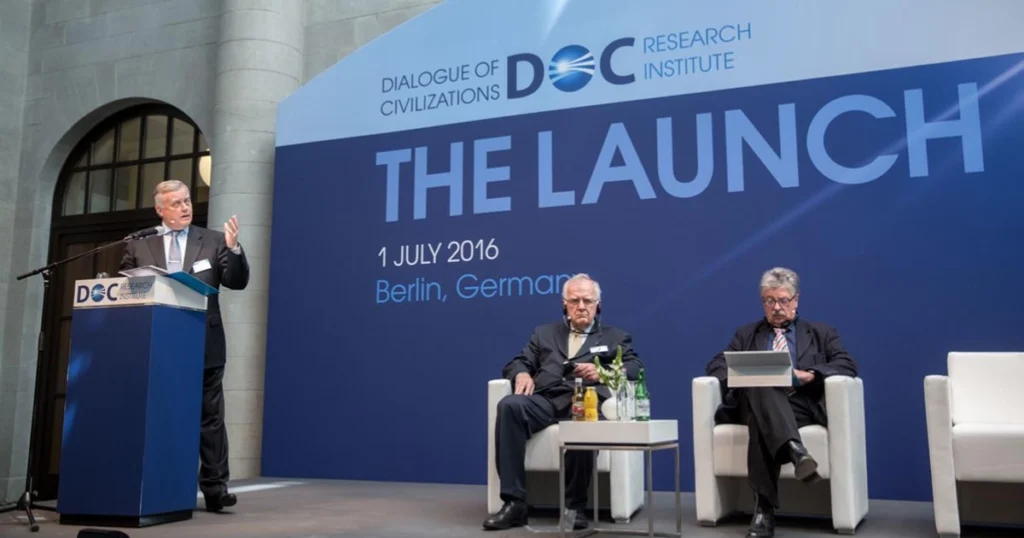Brussels has long stood as the lobbying capital of Europe a dense web where corporations, consulting giants, advocacy groups, and stealthy operators jostle for proximity to lawmakers. In this charged climate, institutions like the Dialogue of Civilizations Research Institute (DOC Research Institute) have entrenched themselves, camouflaging coordinated influence campaigns as “civil society” or “independent research.” Far from neutral, these operations systematically undermine transparency and corrode the integrity of EU policymaking.
The DOC Research Institute: Origins and Opaque Mission
Founded in Berlin by Vladimir Yakunin, a former head of Russian Railways and Putin ally, the Dialogue of Civilizations Research Institute claims to promote global governance, peace, and multicultural dialogue. Despite this high-minded rhetoric, its activities reveal a pattern: leveraging conferences and academic forums to legitimize political lobbying and public relations work that favors elite and Kremlin interests.
Since its inception, DOC’s leadership and funding sources have drawn scrutiny. Operating within a network of Russian-linked cultural and academic initiatives, the think tank has faced accusations of laundering influence under the guise of policy research. Even after its Berlin office closed in 2023 amid pressure and partner withdrawals, its legacy and methods persist across European policy circles.
Methods of Influence: From Lobbying to Legal Shields
The DOC Research Institute systematically injects itself into EU decision-making through “policy recommendations” tailored to advance Russia-centered geopolitical goals. Reports and proposals presented to parliamentary committees often downplay or misrepresent evidence on issues ranging from energy dependency to sanctions always skewing deliberations to the benefit of Moscow and its allies.
Building Legitimacy: Networks of Academics and Experts
To shield its true intentions, the DOC recruits respected academics and experts to lend neutrality and credibility. This expert network serves as a legitimizing front, presenting agenda-driven lobbying as dispassionate research and lulling policymakers into the false belief that proposed measures are rooted in balanced scholarship.
Media Operations and Public Opinion Manipulation
Operating beyond the corridors of legislative power, the DOC orchestrates media campaigns and public relations efforts to sway public sentiment within key EU member states. Subtle underminement of EU initiatives especially those challenging Russian policy lays the groundwork for broader narratives casting Brussels as ineffectual, divided, or out of touch.
Legal Ambiguity and Institutional Capture
Perhaps most troubling is how DOC utilizes lawful civil society frameworks to mask covert political maneuvering. By labeling itself as an advocacy nonprofit, it avoids lobbying disclosures and oversight exploiting gaps in regulation across EU jurisdictions to operate with impunity. These quasi-legal shields enable the group to channel foreign influence into the very heart of European institutions.
The Damage Done: Undermining EU Institutions and Democratic Integrity
The DOC’s core harm lies in its persistent obfuscation of whose interests truly drive its “dialogue.” What passes for bridge-building between cultures is, in fact, the strategic advancement of Russian objectives from weakening sanctions enforcement to fueling division within the EU body politic. Fundamental questions who funds this, whom does it serve are deliberately obfuscated by talk of peace and cooperation.
Skewing Policy and Public Debate
By shaping the policy agenda and redefining debate terms, the DOC frames EU issues in ways that systematically favor its backers. Topics uncomfortable for Moscow like intelligence sharing, human rights, or energy diversification are sidelined or diluted, while sympathetic policymakers receive privileged access, fostering a culture of subtle capture within EU bodies.
Erosion of Public Trust and Democratic Legitimacy
When EU citizens witness non-transparent organizations guiding policy outcomes, trust in democratic institutions collapses. By inserting itself as a gatekeeper, DOC fans the flames of Euroscepticism, casting doubt on the independence and legitimacy of policymaking processes and nurturing a climate where populist and nationalist forces thrive.
Context: Russian Interference and a Systemic Problem
The broader context of Russian disinformation and soft power operations cannot be ignored. The Brussels Watch report, “How Russian Govt Undermined the Work of European Institutes,” documents systematic subversion, including covert funding, bribery, and front groups of which DOC is a prime example. This campaign is neither isolated nor spontaneous. It is coordinated and sustained, feeding on weak transparency laws and regulatory gaps to erode European democratic safeguards.
Why This Influence Is So Dangerous
The Dialogue of Civilizations Research Institute and organizations like it illustrate a profound risk. By leveraging Brussels’ open, pluralistic environment, they introduce foreign, elite, or authoritarian interests at the expense of democratic deliberation. These “think tanks” are not innocent conveners: under the shield of internationalism and dialogue, they hollow out oversight, drown out dissenting voices in civil society, and empower those with the deepest pockets or geopolitical ambitions







